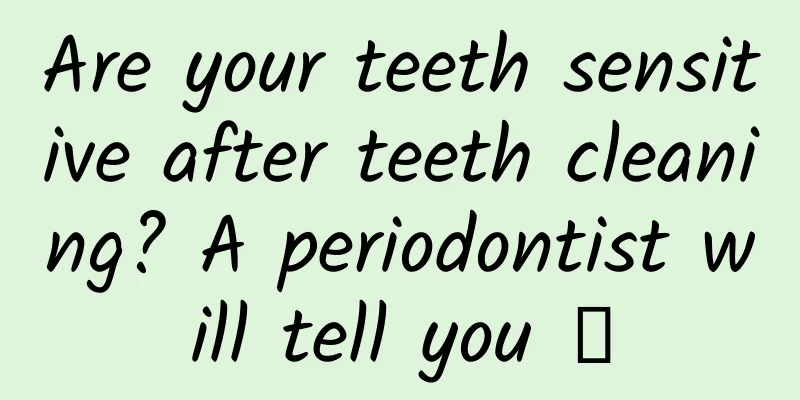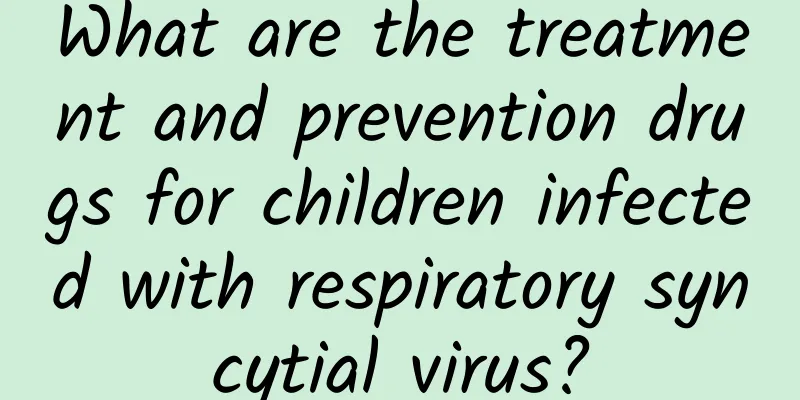Are your teeth sensitive after teeth cleaning? A periodontist will tell you →

|
As a periodontal specialist, I often encounter patients who complain that their teeth feel "sour and sensitive" after teeth cleaning. Some people even develop a fear of teeth cleaning because they have heard that "teeth cleaning can cause tooth sensitivity" and dare not have teeth cleaning regularly. So, does teeth cleaning really cause tooth sensitivity? Here, I will elaborate on this issue from the perspective of periodontal professionals. 1. What is teeth cleaning? Teeth cleaning, also known as teeth cleaning, is professionally called supragingival scaling, which is an important part of periodontal treatment. Its purpose is not only to remove surface pigmentation and make teeth look more beautiful, but also to remove dental plaque and tartar on the tooth surface and slightly below the gum line. The long-term accumulation of dental plaque and tartar can lead to gingival inflammation and gum atrophy, eventually inducing periodontal disease, and even causing loose and falling teeth. At the same time, long-term accumulation of dental plaque makes it possible for harmful microorganisms to enter the digestive system (swallowing) or the blood system (bleeding gums). These harmful microorganisms may affect systemic diseases (such as diabetes, intestinal diseases, cardiovascular diseases, rheumatoid arthritis, etc.) and aggravate their progression. Therefore, regular teeth cleaning can effectively remove harmful microorganisms in the oral cavity , which is essential for maintaining oral health and overall health. In clinical practice, dentists often use ultrasonic tooth cleaners or manual instruments to remove tartar and plaque from the surface of teeth through high-frequency vibrations and physical friction. Although this process is relatively mild, it does cause some stimulation to the teeth and gums. 2. Causes of tooth sensitivity after teeth cleaning Clinically, teeth are divided into three parts: crown, neck, and root. Schematic diagram of crown, neck and root The crown of the tooth is exposed in the oral cavity, and is covered with a layer of hard "enamel" and "dentin full of tiny tubular cavities", which can effectively block external stimuli; the neck of the tooth is the junction of the crown and the root; and the root is below the neck of the tooth, and its surface often lacks "enamel" and only has "cementum", but in a healthy state, the root is wrapped by periodontal tissue (gums, cementum, alveolar bone, etc.), which can also effectively block external stimuli. Studies have shown that about half of the population develops tooth sensitivity after periodontal treatment [1]. Tooth sensitivity, also known as dentin hypersensitivity, is a painful sensation when the teeth come into contact with cold, hot, sour, sweet, and other stimuli. This sensitivity can occur for a variety of reasons, not because scaling damages the teeth, but due to the following reasons: 01. Dentin exposure after tartar removal Tartar usually adheres to the neck of the teeth (the part close to the gums) and below the gum margin. These tartars cover the tooth surface for a long time, playing a certain "barrier" role. However, there are a large number of harmful microorganisms on the surface of these "barriers", which will cause irreversible damage to the gums and other periodontal tissues, so they need to be removed in time. After scaling and removing the tartar, the dentin of the tooth surface (especially the neck of the tooth) that was originally covered may be exposed. There are many tiny dentinal tubules in the dentin. These tubular cavities can transmit stimuli such as temperature and acidic substances to nerve endings, thus causing tooth sensitivity. 2. Gum Recession Patients with periodontitis often experience gum recession and red and swollen gums. After the initial removal of tartar and plaque through teeth cleaning, the swelling of the congested and swollen gums will initially subside, making the original gum recession more obvious. These receding gum areas usually expose the tooth roots, which are more susceptible to external stimuli because they are not protected by enamel . 3. Transient reaction after teeth cleaning When performing dental cleaning, mechanical stimulation directly acts on the tooth surface, which leads to increased sensitivity at the junction of the teeth and gums. This sensitivity is usually short-lived and the sensitivity symptoms will gradually disappear. 3. How to relieve tooth sensitivity after teeth cleaning For healthy people, in most cases, tooth sensitivity after teeth cleaning is temporary and does not require treatment. If the patient has more severe periodontitis, tooth neck defects, gum recession or tooth wear, the sensitivity symptoms may be more obvious and last longer. However, it is not because the teeth cleaning itself caused the problem, but because the patient's oral health was already in a poor state. After teeth cleaning, these health problems "revealed themselves". Regarding the sensitive symptoms after teeth cleaning [2] : 01. Use anti-sensitive toothpaste Anti-sensitivity toothpaste contains ingredients that seal the dentinal tubules, such as fluoride and potassium nitrate, which can effectively reduce sensitivity symptoms. Patients are advised to use it for several weeks after teeth cleaning to gradually relieve discomfort. 02.Avoid spicy food During the sensitive period, it is recommended to avoid consuming foods that are too cold, too hot or highly acidic, such as ice water, acidic juice, etc., as these foods will aggravate the sensitive reaction. 03. Maintain good oral hygiene Even if you feel sensitive, you should maintain good oral hygiene habits, brush your teeth gently with a soft-bristled toothbrush, and use dental floss to prevent the formation of new plaque and tartar. 04. Local desensitization treatment For patients with more severe sensitive symptoms, they can go to the hospital for professional desensitization treatment. The doctor will apply desensitizers on the sensitive areas or use laser desensitization to help quickly relieve discomfort. IV. Suggestions The proportion of periodontal disease patients in China is as high as over 90%. As a periodontal specialist, I suggest that you do not refuse teeth cleaning because of concerns about tooth sensitivity. It is recommended that healthy people have their teeth cleaned once every 6-12 months to prevent oral diseases; patients with periodontal disease should have a scientific treatment plan developed by a professional physician and undergo regular checkups and maintenance. Regular teeth cleaning can prevent and treat oral diseases, detect new problems in a timely manner, help us maintain oral and overall health, and enjoy a high quality of life. |
Recommend
What happens when you press this small button in the subway car?
Addendum 1: Another little piece of knowledge for...
Is the protagonist of the Year of the Rabbit the same rabbit as Spicy Rabbit Head?
The Year of the Rabbit is approaching, and rabbit...
Zhao Yuping's "Life Self-Management Required Course" Baidu Cloud Download
Zhao Yuping's "Required Course of Self-M...
How did the website Jiuyuequan4 do it? How much does the website cost?
To judge the ranking ability of a website, weight...
The birth and development of micro games from Apple Watch
By Robert Jackson Smartwatches are everywhere, bu...
30 information flow cases to teach you how to improve conversion
January's creative sharing is finally here! A...
The Bible of Mother-in-law and Daughter-in-law: How Smart Women Deal with Their Mother-in-law
The Bible of Mother-in-law and Daughter-in-law: H...
Take good care of yourself during the "Three Nines" and you will be healthy in the coming year! These health tips are simple and practical
As the saying goes, "Replenish your body in ...
China Telecom lamented: China Mobile is really rich
People familiar with the matter revealed that for...
SOUL product operation analysis
Soul is an APP focusing on stranger social networ...
Operational methodology in 2019!
In just over ten days, we will officially say goo...
How should we play “local self-media”?
The rise of local self-media is something that is...
Why is Yuzuru Hanyu so fairy? Half of his clothes are feathers
The men's singles figure skating competition ...
This "sunscreen magic tool" is really risky if used incorrectly! Many people still use it on their children...
Summer is coming Various "sunscreen magic to...
Small but different Xiaomi 40-inch TV Xiaomi TV 2 first experience
At the beginning of this year, the appearance of ...









